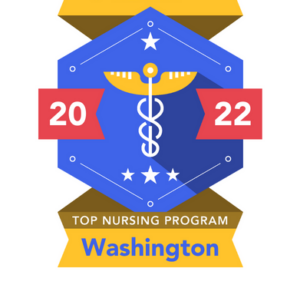The Top Nursing Schools in Washington
 Washington state offers numerous opportunities for those pursuing a nursing career.
Washington state offers numerous opportunities for those pursuing a nursing career.
With over 40 nursing programs in Washington state, prospective students can choose from a variety of pathways, including associate degree in nursing (ADN) or bachelor of science in nursing (BSN) programs.
These programs are designed to help students succeed in the highly competitive and rewarding field of nursing.
Washington’s nursing schools also boast an impressive NCLEX-RN pass rate, which reflects the state’s commitment to high-quality education and patient care.
In addition to a strong educational foundation, Washington provides a thriving nursing job market, with opportunities for registered nurses (RNs) and nurse practitioners (NPs). Whether you’re interested in working in one of the bustling cities like Seattle or a smaller, quieter community, Washington has a wealth of career prospects for nurses.

Struggling to meet your deadline?
Get your assignment on The Top Nursing Schools in Washington done by certified MDs and PhDs in the USA. ORDER NOW!
The Best Nursing Programs in Washington
The Best Nursing Programs in Washington
- University of Washington School of Nursing
- Location: Seattle, WA
- Website: https://nursing.uw.edu
- Description: The University of Washington (UW) School of Nursing stands as one of the top nursing schools in the country, offering a robust education in nursing research, practice, and leadership. The school offers a range of programs, including the Bachelor of Science in Nursing (BSN), Master of Science in Nursing (MSN), Doctor of Nursing Practice (DNP), and Ph.D. in Nursing. UW’s BSN program prepares students with a strong clinical foundation, critical thinking skills, and a comprehensive understanding of healthcare systems. The MSN program offers specializations such as Family Nurse Practitioner (FNP), Nurse Anesthesia, and Nurse Midwifery, while the DNP and Ph.D. programs focus on advanced practice and research leadership. With its partnerships with UW Medicine and Seattle Children’s Hospital, students gain hands-on experience in some of the nation’s top healthcare settings. The school’s focus on innovation, health equity, and rural health makes UW an excellent choice for those looking to impact healthcare locally and globally.
- Accreditation: CCNE
- Tuition: Approx. $11,000 per year (undergraduate, in-state)
- Programs: BSN, MSN, DNP, Ph.D. in Nursing
- Specializations: Family Nurse Practitioner, Nurse Anesthesia, Nurse Educator
- Seattle University College of Nursing
- Location: Seattle, WA
- Website: https://www.seattleu.edu/nursing
- Description: Seattle University’s College of Nursing is highly regarded for its commitment to patient-centered care, social justice, and advanced practice nursing. The BSN program at Seattle U integrates rigorous academic coursework with extensive clinical training at renowned healthcare facilities such as Swedish Medical Center and Providence Health. The school also offers MSN and Doctor of Nursing Practice (DNP) programs, with specialized tracks including Family Nurse Practitioner, Psychiatric-Mental Health Nurse Practitioner, and Nurse Leadership. Seattle U’s commitment to diversity, cultural competency, and community service ensures that students develop the skills necessary to serve diverse populations, particularly those in underserved communities. Additionally, the school offers an online RN-to-BSN program, enabling registered nurses to continue their education while working. With small class sizes, individualized faculty mentorship, and an emphasis on ethical practice, Seattle University provides an excellent education for future nursing leaders.
- Accreditation: CCNE
- Tuition: Approx. $48,000 per year (graduate)
- Programs: BSN, MSN, DNP, RN-to-BSN
- Specializations: Family Nurse Practitioner, Psychiatric-Mental Health Nurse Practitioner, Nurse Leadership
- Washington State University College of Nursing
- Location: Spokane, WA (with additional campuses in Vancouver, Tri-Cities, and Yakima)
- Website: https://nursing.wsu.edu
- Description: Washington State University (WSU) College of Nursing offers a comprehensive and affordable nursing education with campuses across the state. The BSN program prepares students for nursing practice through an evidence-based curriculum that integrates classroom learning with hands-on clinical experience in hospitals and clinics throughout Washington. WSU offers an MSN program with tracks like Family Nurse Practitioner (FNP) and Psychiatric-Mental Health Nurse Practitioner, as well as a Doctor of Nursing Practice (DNP) program. The school is dedicated to addressing healthcare challenges in rural and underserved areas, and students benefit from the university’s partnerships with local healthcare providers, such as Providence Health Services and St. Joseph’s Regional Medical Center. WSU’s online RN-to-BSN program is ideal for working nurses looking to advance their education while balancing their professional commitments.
- Accreditation: CCNE
- Tuition: Approx. $11,000 per year (undergraduate, in-state)
- Programs: BSN, MSN, DNP, RN-to-BSN
- Specializations: Family Nurse Practitioner, Psychiatric-Mental Health Nurse Practitioner, Nurse Educator
- Gonzaga University School of Nursing and Human Physiology
- Location: Spokane, WA
- Website: https://www.gonzaga.edu
- Description: Gonzaga University’s School of Nursing and Human Physiology offers exceptional nursing programs that focus on holistic care, leadership, and ethical nursing practice. The school’s Bachelor of Science in Nursing (BSN) program is known for its rigorous academic standards, evidence-based practice approach, and a strong emphasis on community health. Gonzaga’s graduate programs, including the Doctor of Nursing Practice (DNP) program, prepare nurse leaders for advanced practice roles in areas like nurse leadership, clinical care, and healthcare policy. The university’s commitment to service, social justice, and community engagement is reflected in its curriculum and student-centered approach. Students have clinical placement opportunities with top healthcare organizations like Sacred Heart Medical Center, gaining valuable hands-on experience. The integration of nursing education with the Jesuit mission of caring for the whole person ensures that graduates of Gonzaga are well-equipped to serve diverse populations.
- Accreditation: CCNE
- Tuition: Approx. $47,000 per year (graduate)
- Programs: BSN, DNP
- Specializations: Nurse Leadership, Nurse Educator
- Pacific Lutheran University School of Nursing
- Location: Tacoma, WA
- Website: https://www.plu.edu/nursing
- Description: Pacific Lutheran University’s (PLU) School of Nursing provides a nurturing, personalized learning environment where students develop both the clinical expertise and leadership skills needed for a successful nursing career. The school’s Bachelor of Science in Nursing (BSN) program offers students a comprehensive education that integrates advanced nursing theory with clinical experiences at local hospitals and healthcare centers like MultiCare Health System. The university also offers a Master of Science in Nursing (MSN) program with specializations in Family Nurse Practitioner and Nurse Leadership. With small class sizes, one-on-one faculty mentorship, and a strong focus on community health and nursing ethics, PLU ensures that its graduates are prepared to address the evolving needs of the healthcare industry.
- Accreditation: CCNE
- Tuition: Approx. $45,000 per year (graduate)
- Programs: BSN, MSN
- Specializations: Family Nurse Practitioner, Nurse Leadership
- Seattle Pacific University School of Health Sciences
- Location: Seattle, WA
- Website: https://spu.edu
- Description: Seattle Pacific University (SPU) offers a highly respected nursing program that combines academic rigor with a Christian worldview. The Bachelor of Science in Nursing (BSN) program at SPU emphasizes patient-centered care, clinical competence, and the development of leadership skills. Students benefit from small class sizes and faculty mentorship, ensuring a personalized learning experience. SPU’s BSN program is designed to prepare graduates for the NCLEX-RN and a successful nursing career in various healthcare settings. The school’s graduate programs, including a Master of Science in Nursing (MSN), offer advanced practice tracks such as Family Nurse Practitioner and Nurse Educator. SPU’s strong partnerships with healthcare facilities, including Swedish Medical Center and Harborview Medical Center, provide students with excellent clinical opportunities. The school’s commitment to service, ethics, and social justice equips students to become leaders in nursing and advocates for diverse populations in need of high-quality care.
- Accreditation: CCNE
- Tuition: Approx. $42,000 per year (graduate)
- Programs: BSN, MSN
- Specializations: Family Nurse Practitioner, Nurse Educator
- Evergreen State College Nursing Program
- Location: Olympia, WA
- Website: https://www.evergreen.edu
- Description: The Evergreen State College offers a unique approach to nursing education with a Bachelor of Science in Nursing (BSN) completion program designed for registered nurses (RNs) who hold an associate degree in nursing. The program is tailored to working professionals and provides a flexible, interdisciplinary curriculum that focuses on evidence-based practice, leadership, and community health. Evergreen’s collaborative and experiential approach to education ensures that nursing students gain both theoretical knowledge and hands-on clinical experience, while also developing a deep understanding of healthcare policy, social justice, and ethical practice. The program’s strong focus on rural healthcare and underserved communities makes it an excellent choice for RNs looking to expand their career opportunities.
- Accreditation: CCNE
- Tuition: Approx. $10,000 per year (undergraduate)
- Programs: RN-to-BSN
- Specializations: Registered Nurse
- Central Washington University Department of Nursing
- Location: Ellensburg, WA
- Website: https://www.cwu.edu/nursing
- Description: Central Washington University (CWU) offers a well-rounded Bachelor of Science in Nursing (BSN) program designed to prepare students for nursing practice in a variety of healthcare settings. The program emphasizes clinical skills, communication, and leadership while preparing students to meet the challenges of the rapidly evolving healthcare environment. CWU’s Department of Nursing offers hands-on clinical training with local hospitals and healthcare facilities, providing real-world experience in rural and urban settings. CWU also offers an RN-to-BSN program for registered nurses who wish to further their education. The department is committed to developing nurse leaders who can positively impact the healthcare system and serve diverse populations.
- Accreditation: CCNE
- Tuition: Approx. $11,000 per year (undergraduate, in-state)
- Programs: BSN, RN-to-BSN
- Specializations: Registered Nurse
- Walla Walla University School of Nursing
- Location: College Place, WA
- Website: https://www.wallawalla.edu
- Description: Walla Walla University offers a robust nursing program that prepares students to become competent and compassionate nurses. The school offers a Bachelor of Science in Nursing (BSN) program with a strong emphasis on holistic care, spiritual growth, and leadership. Students engage in clinical rotations in partnership with local healthcare providers, gaining experience in diverse patient care settings. Walla Walla’s BSN program is unique for its focus on service and community engagement, preparing nurses to serve in a wide range of healthcare environments. The university is affiliated with the Seventh-day Adventist Church, integrating faith-based values into its curriculum.
- Accreditation: CCNE
- Tuition: Approx. $30,000 per year (undergraduate)
- Programs: BSN
- Specializations: Registered Nurse
- Northwest University School of Nursing
- Location: Kirkland, WA
- Website: https://www.northwestu.edu
- Description: Northwest University offers a Bachelor of Science in Nursing (BSN) program that combines rigorous academic coursework with hands-on clinical practice. The program is designed to prepare students to work in a variety of healthcare settings, including hospitals, clinics, and community health organizations. Northwest University’s nursing program emphasizes leadership, evidence-based practice, and compassionate care. The faculty are dedicated to providing students with personalized support, ensuring that they are prepared to meet the demands of the nursing profession. The university’s Christian values and emphasis on service to others create a supportive and dynamic learning environment for aspiring nurses.
- Accreditation: CCNE
- Tuition: Approx. $37,000 per year (undergraduate)
- Programs: BSN
- Specializations: Registered Nurse
Top Nursing Programs in Washington
When considering nursing programs in Washington state, there are numerous factors to consider, such as academic quality, affordability, reputation, and the types of nursing degrees offered. Washington’s nursing schools cater to students at all levels, from ADN programs for those looking to quickly enter the field, to BSN programs that provide more advanced education. Additionally, there are options for online nursing programs in Washington for those seeking flexibility in their studies.
Here’s a list of some of the best nursing schools in Seattle and beyond, which offer a range of degree programs from RN licensure in Washington to advanced practice nurses in Washington. These programs are not only accredited but also provide students with access to a strong clinical network to help prepare them for their careers in nursing. 
How to Choose a Nursing Program in Washington
When selecting a nursing school in Washington, it’s important to consider several key factors:
- Program Accreditation:
Ensure that the program is accredited by a recognized body, like the Accreditation Commission for Education in Nursing (ACEN), as this impacts licensure eligibility and job prospects. - NCLEX-RN Pass Rates:
A high NCLEX-RN pass rate is an indicator of how well the program prepares students for the licensing exam. Washington nursing programs typically have a high pass rate, often above the national average of 88%. - Cost and Financial Aid:
Look into the cost of nursing school in Washington, as tuition can vary significantly between public and private schools. Many nursing schools also offer scholarships, grants, and other financial aid to make programs more affordable. - Program Flexibility:
Consider whether you need a nursing degree online in Washington or prefer an in-person experience. Many schools offer best online nursing programs in Washington state, which can be a cost-effective and flexible option for working professionals. - Job Placement and Clinical Opportunities:
Look for programs that provide strong clinical placements and connections to the Washington nursing job market. Many top programs offer partnerships with local hospitals and healthcare systems, giving students a chance to gain hands-on experience.
Reasons to Pursue a Nursing Career in Washington
Pursuing a nursing career in Washington offers numerous advantages, from competitive salaries to a growing job market. Washington is home to one of the fastest-growing healthcare sectors in the country, with a projected nursing job growth in Washington of 20.5% for RNs from 2020 to 2030. The demand for advanced practice nurses in Washington, including nurse practitioners, is also on the rise. The NCLEX-RN pass rate for nursing programs in Washington is an impressive 90.6%, surpassing the national average of 88%.
Washington nurses enjoy some of the highest salaries in the country. The average salary for registered nurses in Washington is $91,310, which is significantly higher than the national average of $80,010. Nurse practitioners in Washington earn even more, with an average annual salary of $126,480.
Washington’s diverse landscape, from the cosmopolitan city life of Seattle to the scenic beauty of rural areas, offers a range of living environments, making it an appealing location for nurses. In addition to great pay and job security, the state offers a temperate climate ideal for outdoor activities, contributing to a healthy work-life balance.
Salary and Job Outlook for Nurses in Washington
Registered Nurse salary in Washington is significantly higher than the national average. RNs in the state earn an average salary of $91,310, while nurse practitioners earn around $126,480 annually. However, it’s important to consider the higher cost of living in Washington, particularly in cities like Seattle, where the cost of living is 111.6% of the national average (indexed at 100). Seattle, in particular, boasts one of the highest costs of living in the nation.
The nursing job market in Washington is booming, with strong demand for nurses across the state. Nurse practitioners can expect a job growth rate of 28.5% from 2020 to 2030, which is faster than the national average of 28.2%.
Washington is home to some of the highest-paying cities for nurses. For example, Seattle—Tacoma—Bellevue offers an average RN salary of $95,120, while Olympia—Tumwater offers $93,270. Smaller cities like Walla Walla and Spokane—Spokane Valley also offer competitive salaries for nurses.
Steps to Becoming a Nurse in Washington
To become a registered nurse (RN) in Washington, you need to follow these steps:
- Complete an Accredited Nursing Program: You can choose between an ADN or BSN program. Many students opt for a BSN because it offers more career opportunities and advancement potential.
- Pass the NCLEX-RN: After graduating, you’ll need to pass the NCLEX-RN exam to become licensed.
- Submit Your Application: Submit your application to the Washington State Nursing Commission, which includes a criminal background check and application fees.
- Transition to Practice: Washington offers a Transition to Practice program for new graduates, which provides support as you enter the workforce.
For those interested in becoming an Advanced Practice Registered Nurse (APRN) in Washington, the process is more extensive. You must complete a Master of Science in Nursing (MSN) or Doctor of Nursing Practice (DNP) program, pass board certification, and apply for prescribing authority.
Highest-Paying Cities for Nurses in Washington
Several cities in Washington offer high salaries for nurses:
| Top Paying Metropolitan Areas | Average Salary for RNs |
|---|---|
| Seattle — Tacoma — Bellevue | $95,120 |
| Olympia — Tumwater | $93,270 |
| Wenatchee | $88,550 |
| Spokane — Spokane Valley | $89,890 |
| Walla Walla | $91,280 |
Source: BLS
These areas also tend to have strong job opportunities, particularly in healthcare centers and hospitals.
Cost of Nursing School in Washington
The cost of nursing school in Washington varies depending on whether you attend a public or private institution, and whether you pursue an online or on-campus program. Private universities tend to have higher tuition rates, while public universities offer more affordable options. Online nursing programs are often the most cost-effective and flexible option, especially for working professionals or those with family commitments.
Frequently Asked Questions About Nursing in Washington
What is the duration of the RN program in Washington?
The duration of an RN program in Washington depends on the type of degree you pursue. An ADN program typically takes two years to complete, while a BSN program takes four years. Many students opt to pursue a BSN as it offers more opportunities for career advancement.
How can I become an RN in Washington?
To become an RN in Washington, you need to complete an accredited nursing program, such as an ADN or BSN, and then pass the NCLEX-RN exam. Once you pass the exam, you can apply for licensure with the Washington State Nursing Commission.
What is considered the best nursing college in Washington?
The best nursing school for you will depend on your individual needs, such as location, cost, and program format. Some of the best nursing schools in Seattle and the rest of the state include the University of Washington, Seattle University, and Washington State University.
How much does nursing school cost in Washington?
The cost of nursing school varies. Public universities tend to be more affordable, while private schools may be more expensive. Online nursing programs in Washington can often be a more cost-effective choice for students looking for flexibility.
By choosing one of the accredited nursing programs in Washington, students can embark on a rewarding career in a state that offers excellent job prospects, competitive salaries, and a growing demand for healthcare professionals. Whether you’re interested in a traditional on-campus program or a best online nursing program in Washington state, the opportunities are plentiful for aspiring nurses.

Dont wait until the last minute.
Provide your requirements and let our native nursing writers deliver your assignments ASAP.

